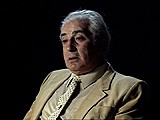
Oral History
Browse an alphabetical list of survivors’ oral histories. These interviews describe firsthand accounts and personal experiences during the Holocaust and World War II.
<< Previous | Displaying results 401-450 of 572 for "Oral History" | Next >>
-
Norbert Wollheim describes deportation from Berlin
Oral HistoryNorbert studied law and was a social worker in Berlin. He worked on the Kindertransport (Children's Transport) program, arranging to send Jewish children from Europe to Great Britain. His parents, who also lived in Berlin, were deported in December 1942. Norbert, his wife, and their child were deported to Auschwitz in March 1943. He was separated from his wife and child, and sent to the Buna works near Auschwitz III (Monowitz) for forced labor. Norbert survived the Auschwitz camp, and was liberated by US…
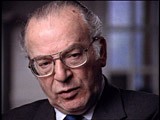
-
Norbert Wollheim describes forced labor at the Buna works
Oral HistoryNorbert studied law and was a social worker in Berlin. He worked on the Kindertransport (Children's Transport) program, arranging to send Jewish children from Europe to Great Britain. His parents, who also lived in Berlin, were deported in December 1942. Norbert, his wife, and their child were deported to Auschwitz in March 1943. He was separated from his wife and child, and sent to the Buna works near Auschwitz III (Monowitz) for forced labor. Norbert survived the Auschwitz camp, and was liberated by US…
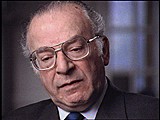
-
Norbert Wollheim describes his experiences on a transport during deportation from Berlin
Oral HistoryNorbert studied law and was a social worker in Berlin. He worked on the Kindertransport (Children's Transport) program, arranging to send Jewish children from Europe to Great Britain. His parents, who also lived in Berlin, were deported in December 1942. Norbert, his wife, and their child were deported to Auschwitz in March 1943. He was separated from his wife and child, and sent to the Buna works near Auschwitz III (Monowitz) for forced labor. Norbert survived the Auschwitz camp, and was liberated by US…
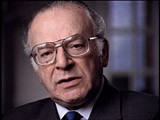
-
Norbert Wollheim describes his liberation at Schwerin, in northeast Germany, in May 1945
Oral HistoryNorbert studied law and was a social worker in Berlin. He worked on the Kindertransport (Children's Transport) program, arranging to send Jewish children from Europe to Great Britain. His parents, who also lived in Berlin, were deported in December 1942. Norbert, his wife, and their child were deported to Auschwitz in March 1943. He was separated from his wife and child, and sent to the Buna works near Auschwitz III (Monowitz) for forced labor. Norbert survived the Auschwitz camp, and was liberated by US…
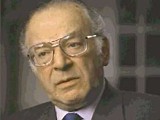
-
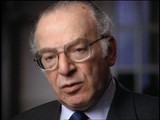
-
Olympic athlete John Woodruff describes his experiences of discrimination
Oral HistoryIn 1936, John Woodruff was one of 18 African Americans on the US Olympic team competing in Berlin. He won the gold medal for the men's 800-meter race. In this clip from an interview on May 15, 1996, Woodruff describes his personal experiences of racial discrimination during and after the Olympic Games of 1936.
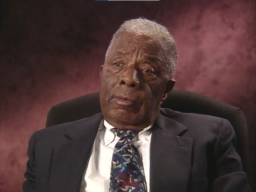
-
Olympic athlete John Woodruff describes his tactics for winning the 800-meter race
Oral HistoryOlympic athlete John Woodruff describes his tactics for winning the 800-meter race
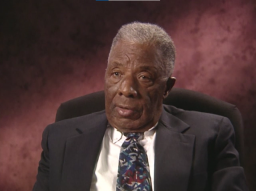
-
Paul Eggert, Helga Gross, and Dorothea Buck describe forced sterilization
Oral HistoryPaul Eggert was categorized as "feeble-minded." At age 11, he was institutionalized and sterilized without his knowledge. Helga Gross attended a school for the deaf in Hamburg, Germany. She was sterilized in 1939, aged 16. At age 19, Dorothea Buck was diagnosed as schizophrenic and sterilized without her knowledge. [Photo credits: Getty Images, New York City; Yad Vashem, Jerusalem; Max-Planck-Institut für Psychiatrie (Deutsche Forschungsanstalt für Psychiatrie), Historisches Archiv, Bildersammlung GDA,…
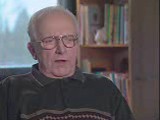
-
Peter Becker describes indoctrination and being in the Hitler Youth
Oral HistoryPeter was six years old when his mother enrolled him in a special Hitler boarding school for future Nazi Party officials in 1935. He studied traditional academic subjects, but was constantly exposed to Nazi ideas and prepared for a military life. Peter was also a member of the Hitler Youth. He came to believe in Hitler as the savior of Germany. Peter would later describe his indoctrination as a subtle process. It took two years after the war had ended for Peter to come to terms with the atrocities that the…
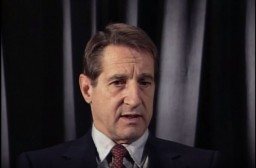
-
Peter Black describes the role of historians in researching war crimes cases for OSI
Oral HistoryIn the 1980s and 1990s, historian Peter Black worked for the US Department of Justice Office of Special Investigations, as part of a team tracking and prosecuting suspected war criminals. Black later served as the Senior Historian at the United States Holocaust Memorial Museum.
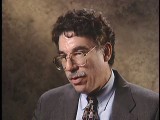
-
Peter Black describes why it is important to continue pursuing justice, even decades after the events
Oral HistoryIn the 1980s and 1990s, historian Peter Black worked for the US Department of Justice Office of Special Investigations, as part of a team tracking and prosecuting suspected war criminals. Black later served as the Senior Historian at the United States Holocaust Memorial Museum.
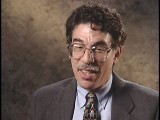
-
Preben Munch-Nielsen describes a fishing boat used to carry Jews to safety in Sweden
Oral HistoryPreben was born to a Protestant family in Snekkersten, a small fishing village. The Germans invaded Denmark in 1940. Preben became a courier in the resistance. When the Gestapo (German Secret State Police) began hunting down Jews in Denmark in October 1943, Preben helped hide refugees in houses near the shore and led them to boats which took them to Sweden. Preben himself had to take refuge in Sweden in November 1943. He returned to Denmark in May 1945.
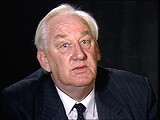
-
Preben Munch-Nielsen describes the Danish people's responsibility to help their Jewish fellow citizens
Oral HistoryPreben was born to a Protestant family in Snekkersten, a small fishing village. The Germans invaded Denmark in 1940. Preben became a courier in the resistance. When the Gestapo (German Secret State Police) began hunting down Jews in Denmark in October 1943, Preben helped hide refugees in houses near the shore and led them to boats which took them to Sweden. Preben himself had to take refuge in Sweden in November 1943. He returned to Denmark in May 1945.
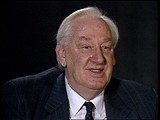
-
Preben Munch-Nielsen describes the precautions taken during boat crossings which took Jews to safety in Sweden
Oral HistoryPreben was born to a Protestant family in Snekkersten, a small fishing village. The Germans invaded Denmark in 1940. Preben became a courier in the resistance. When the Gestapo (German Secret State Police) began hunting down Jews in Denmark in October 1943, Preben helped hide refugees in houses near the shore and led them to boats which took them to Sweden. Preben himself had to take refuge in Sweden in November 1943. He returned to Denmark in May 1945.
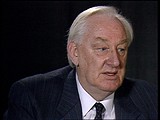
-
Rachel Mutterperl Goldfarb describes how partisans obtained weapons from German soldiers
Oral HistoryThe Germans established a ghetto in Dokszyce in late 1941. Rachel hid during the liquidation of the ghetto in 1942, and she and her mother escaped to another ghetto. When the second ghetto was about to be liquidated, they escaped again. Rachel and her mother joined a band of partisans in the forest. She helped her mother to cook, and also cleaned weapons. Rachel and her mother tried to leave Europe when the war ended. They eventually arrived in the United States, in 1947.
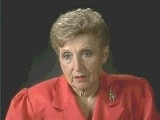
-
Rachel Mutterperl Goldfarb describes partisan attacks on Germans
Oral HistoryThe Germans established a ghetto in Dokszyce in late 1941. Rachel hid during the liquidation of the ghetto in 1942, and she and her mother escaped to another ghetto. When the second ghetto was about to be liquidated, they escaped again. Rachel and her mother joined a band of partisans in the forest. She helped her mother to cook, and also cleaned weapons. Rachel and her mother tried to leave Europe when the war ended. They eventually arrived in the United States, in 1947.
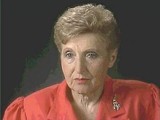
-
Raszka (Roza) Galek Brunswic describes a roundup in the Warsaw ghetto and her escape from deportation
Oral HistoryRoza's family moved to Warsaw in 1934. She had just begun college when Germany invaded Poland in 1939. In 1940, the Germans sealed the Warsaw ghetto, where her parents were shot during a roundup. Roza escaped and went into hiding. From her hiding place she saw the burning of the ghetto in the 1943 uprising. She had false papers stating she was a Polish Catholic (Maria Kowalczyk), and was deported by cattle train to Germany in June 1943. She worked on a farm until liberation in 1945.
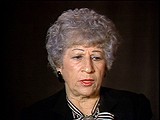
-
Raszka (Roza) Galek Brunswic describes her decision, while posing as a Polish Catholic, to work on a farm in Germany
Oral HistoryRoza's family moved to Warsaw in 1934. She had just begun college when Germany invaded Poland in 1939. In 1940, the Germans sealed the Warsaw ghetto, where her parents were shot during a roundup. Roza escaped and went into hiding. From her hiding place she saw the burning of the ghetto in the 1943 uprising. She had false papers stating she was a Polish Catholic (Maria Kowalczyk), and was deported by cattle train to Germany in June 1943. She worked on a farm until liberation in 1945.
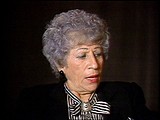
-
Rene Slotkin describes experiencing antisemitism in school in postwar Kosice
Oral HistoryRene and his twin sister Irene were born Rene and Renate Guttman. The family moved to Prague shortly after the twins' birth, where they were living when the Germans occupied Bohemia and Moravia in March 1939. A few months later, uniformed Germans arrested their father. Decades later, Rene and Irene learned that he was killed in the Auschwitz camp in December 1941. Rene, Irene, and their thier mother were deported to the Theresienstadt ghetto, and later to Auschwitz. There, the twins were separated and…
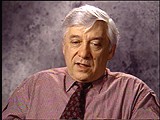
-
Rene Slotkin describes medical experiments at Auschwitz
Oral HistoryRene and his twin sister Irene were born Rene and Renate Guttman. The family moved to Prague shortly after the twins' birth, where they were living when the Germans occupied Bohemia and Moravia in March 1939. A few months later, uniformed Germans arrested their father. Decades later, Rene and Irene learned that he was killed in the Auschwitz camp in December 1941. Rene, Irene, and their thier mother were deported to the Theresienstadt ghetto, and later to Auschwitz. There, the twins were separated and…
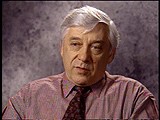
-
Renee Schwalb Fritz describes her experience as a Jewish child hiding in a Catholic convent
Oral HistoryRenee's father left for the United States in 1939. Before Renee and her mother could join him, they had to flee to Belgium to escape the repression of Jews in Austria. The Germans occupied Belgium in 1940. Renee was hidden in a convent for two years, until the Germans became suspicious. The underground took Renee to a Protestant family's farm, and then to an orphanage. After the war she was reunited with her mother, who had survived Auschwitz. Five years later they joined her father in the United States.
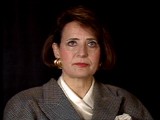
-
Rifka Muscovitz Glatz describes emotions surrounding the establishment of the state of Israel
Oral HistoryRifka was raised in a religious family in Debrecen. In the early 1940s, her family moved to Cluj (Kolozsvar) in Northern Transylvania, annexed to Hungary from Romania in 1940. In 1944, she and her family were forced to leave their house in Cluj. They were rounded up by Hungarian troops helping the Nazis and taken to a brick factory where they stayed for a month. In June 1944, Rifka was transported to the Bergen-Belsen concentration camp. Eight months later she was transported to Switzerland. She sailed to…
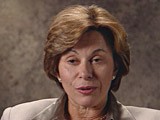
-
Rifka Muscovitz Glatz describes living on a kibbutz and dealing with language barriers
Oral HistoryRifka was raised in a religious family in Debrecen. In the early 1940s, her family moved to Cluj (Kolozsvar) in Northern Transylvania, annexed to Hungary from Romania in 1940. In 1944, she and her family were forced to leave their house in Cluj. They were rounded up by Hungarian troops helping the Nazis and taken to a brick factory where they stayed for a month. In June 1944, Rifka was transported to the Bergen-Belsen concentration camp. Eight months later she was transported to Switzerland. She sailed to…
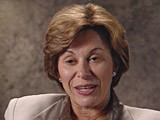
-
Robert Mills Donihi describes a Buchenwald survivor who became a witness at a postwar US trial in Germany
Oral HistoryIn 1945, Robert Mills Donihi was practicing law in Nashville, Tennessee. He accepted a government assignment to Tokyo where he worked on the trial of 28 high-ranking Japanese officers. After a year, he left for Germany, and arrived in Nuremberg in January 1947. Donihi was a member of the legal team at the postwar US trials in Germany, serving as both an interrogator and a prosecutor.
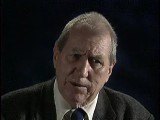
-
Robert Mills Donihi describes defendants at the postwar US trials in Germany
Oral HistoryIn 1945, Robert Mills Donihi was practicing law in Nashville, Tennessee. He accepted a government assignment to Tokyo where he worked on the trial of 28 high-ranking Japanese officers. After a year, he left for Germany, and arrived in Nuremberg in January 1947. Donihi was a member of the legal team at the postwar US trials in Germany, serving as both an interrogator and a prosecutor.
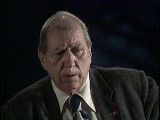
-
Robert Mills Donihi describes witnesses at the postwar US trials in Germany
Oral HistoryIn 1945, Robert Mills Donihi was practicing law in Nashville, Tennessee. He accepted a government assignment to Tokyo where he worked on the trial of 28 high-ranking Japanese officers. After a year, he left for Germany, and arrived in Nuremberg in January 1947. Donihi was a member of the legal team at the postwar US trials in Germany, serving as both an interrogator and a prosecutor.
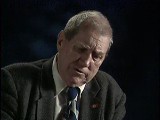
-
Robert Wagemann describes fleeing from a clinic where, his mother feared, he was to be put to death by euthanasia
Oral HistoryRobert and his family were Jehovah's Witnesses. The Nazis regarded Jehovah's Witnesses as enemies of the state for their refusal to take an oath of loyalty to Adolf Hitler, or to serve in the German army. Robert's family continued its religious activities despite Nazi persecution. Shortly before Robert's birth, his mother was imprisoned briefly for distributing religious materials. Robert's hip was injured during delivery, leaving him with a disability. When Robert was five years, he was ordered to report…
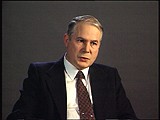
-
Robert Wagemann describes secret Jehovah's Witness prayer meetings in Nazi Germany
Oral HistoryRobert and his family were Jehovah's Witnesses. The Nazis regarded Jehovah's Witnesses as enemies of the state for their refusal to take an oath of loyalty to Adolf Hitler, or to serve in the German army. Robert's family continued its religious activities despite Nazi persecution. Shortly before Robert's birth, his mother was imprisoned briefly for distributing religious materials. Robert's hip was injured during delivery, leaving him with a disability. When Robert was five years, he was ordered to report…
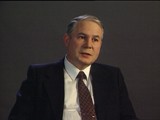
-
Rochelle Blackman Slivka describes a death march from Stutthof
Oral HistoryThe Germans occupied Vilna in June 1941. In October, Rochelle and her family were confined to the Vilna ghetto, where her mother died. Her father, a Jewish council member, was killed in a camp in Estonia. When the ghetto was liquidated in 1943, Rochelle and her sister were deported--first to the Kaiserwald camp in Latvia and later to Stutthof, near Danzig. In 1945, on the sixth week of a death march that forced the sisters to protect their bare feet with rags, the Soviet army liberated them.
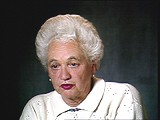
-
Rochelle Blackman Slivka describes the formation of the Vilna ghetto
Oral HistoryThe Germans occupied Vilna in June 1941. In October, Rochelle and her family were confined to the Vilna ghetto, where her mother died. Her father, a Jewish council member, was killed in a camp in Estonia. When the ghetto was liquidated in 1943, Rochelle and her sister were deported--first to the Kaiserwald camp in Latvia and later to Stutthof, near Danzig. In 1945, on the sixth week of a death march that forced the sisters to protect their bare feet with rags, the Soviet army liberated them.
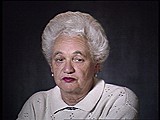
-
Ruth Berkowicz Segal describes deciding to leave Warsaw shortly after the outbreak of war
Oral HistoryWhen German forces invaded Poland in September 1939, Ruth's father fled to eastern Poland. Upon the Soviet occupation of eastern Poland, he fled to Lithuania. Ruth left Warsaw with two friends to find her father and later joined him in Vilna. After Soviet forces occupied Lithuania, Ruth and her father obtained transit visas for Japan, but only Ruth obtained a Soviet exit visa. Her father insisted she leave and not wait for him. Ruth traveled by the Trans-Siberian Railroad across the Soviet Union to…
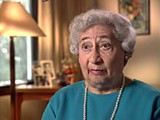
-
Ruth Berkowicz Segal describes finding her father in Vilna after he fled Soviet-occupied eastern Poland
Oral HistoryWhen German forces invaded Poland in September 1939, Ruth's father fled to eastern Poland. Upon the Soviet occupation of eastern Poland, he fled to Lithuania. Ruth left Warsaw with two friends to find her father and later joined him in Vilna. After Soviet forces occupied Lithuania, Ruth and her father obtained transit visas for Japan, but only Ruth obtained a Soviet exit visa. Her father insisted she leave and not wait for him. Ruth traveled by the Trans-Siberian Railroad across the Soviet Union to…
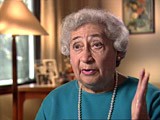
-
Ruth Berkowicz Segal describes journey to and arrival in Japan
Oral HistoryWhen German forces invaded Poland in September 1939, Ruth's father fled to eastern Poland. Upon the Soviet occupation of eastern Poland, he fled to Lithuania. Ruth left Warsaw with two friends to find her father and later joined him in Vilna. After Soviet forces occupied Lithuania, Ruth and her father obtained transit visas for Japan, but only Ruth obtained a Soviet exit visa. Her father insisted she leave and not wait for him. Ruth traveled by the Trans-Siberian Railroad across the Soviet Union to…
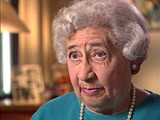
-
Ruth Berkowicz Segal describes receiving visa to leave Lithuania
Oral HistoryWhen German forces invaded Poland in September 1939, Ruth's father fled to eastern Poland. Upon the Soviet occupation of eastern Poland, he fled to Lithuania. Ruth left Warsaw with two friends to find her father and later joined him in Vilna. After Soviet forces occupied Lithuania, Ruth and her father obtained transit visas for Japan, but only Ruth obtained a Soviet exit visa. Her father insisted she leave and not wait for him. Ruth traveled by the Trans-Siberian Railroad across the Soviet Union to…
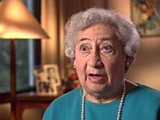
-
Ruth Meyerowitz describes deportation to and conditions in Ravensbrück
Oral HistoryIn Frankfurt, Ruth's family faced intensifying anti-Jewish measures; her father's business was taken over and Ruth's Jewish school was closed. In April 1943, Ruth and her family were deported to Auschwitz. Ruth was forced to work on road repairs. She also worked in the "Kanada" unit, sorting possessions brought into the camp. In November 1944, Ruth was transferred to the Ravensbrueck camp system, in Germany. She was liberated in May 1945, during a death march from the Malchow camp.
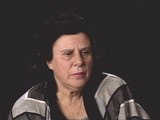
-
Ruth Meyerowitz describes her memories of the Auschwitz crematoria
Oral HistoryIn Frankfurt, Ruth's family faced intensifying anti-Jewish measures; her father's business was taken over and Ruth's Jewish school was closed. In April 1943, Ruth and her family were deported to Auschwitz. Ruth was selected for forced labor and assigned to work on road repairs. She also worked in the "Kanada" unit, sorting possessions brought into the camp. In November 1944, Ruth was transferred to the Ravensbrueck camp system, in Germany. She was liberated in May 1945, during a death march from the…
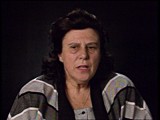
-
Ruth Meyerowitz describes sabotage effort in Malchow munitions factory
Oral HistoryIn Frankfurt, Ruth's family faced intensifying anti-Jewish measures; her father's business was taken over and Ruth's Jewish school was closed. In April 1943, Ruth and her family were deported to Auschwitz. Ruth was selected for forced labor and assigned to work on road repairs. She also worked in the "Kanada" unit, sorting possessions brought into the camp. In November 1944, Ruth was transferred to the Ravensbrueck camp system, in Germany. She was liberated in May 1945, during a death march from the…
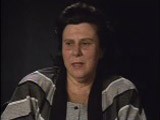
-
Ruth Meyerowitz describes surviving a selection for the gas chamber
Oral HistoryIn Frankfurt, Ruth's family faced intensifying anti-Jewish measures; her father's business was taken over and Ruth's Jewish school was closed. In April 1943, Ruth and her family were deported to Auschwitz. Ruth was selected for forced labor and assigned to work on road repairs. She also worked in the "Kanada" unit, sorting possessions brought into the camp. In November 1944, Ruth was transferred to the Ravensbrueck camp system, in Germany. She was liberated in May 1945, during a death march from the…
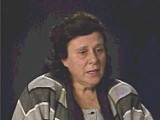
-
Ruth Moser Borsos describes forced-labor assignments in Westerbork
Oral HistoryRuth moved to the Netherlands after Kristallnacht (the "Night of Broken Glass") in 1938. She and her father had permits to sail to the United States, but Germany invaded the Netherlands in May 1940 and they could not leave. Ruth was deported to the Westerbork camp in 1943 and to the Bergen-Belsen camp in Germany in 1944. After an exchange agreement with the Allies broke down, Ruth was interned near the Swiss border until liberation by French forces in 1945.
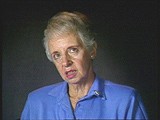
-
Ruth Moser Borsos describes roll call (Appell) in Bergen-Belsen
Oral HistoryRuth moved to the Netherlands after Kristallnacht (the "Night of Broken Glass") in 1938. She and her father had permits to sail to the United States, but Germany invaded the Netherlands in May 1940 and they could not leave. Ruth was deported to the Westerbork camp in 1943 and to the Bergen-Belsen camp in Germany in 1944. After an exchange agreement with the Allies broke down, Ruth was interned near the Swiss border until liberation by French forces in 1945.
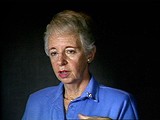
-
Ruth Moser Borsos describes the process of selection for deportations from Westerbork to Auschwitz
Oral HistoryRuth moved to the Netherlands after Kristallnacht (the "Night of Broken Glass") in 1938. She and her father had permits to sail to the United States, but Germany invaded the Netherlands in May 1940 and they could not leave. Ruth was deported to the Westerbork camp in 1943 and to the Bergen-Belsen camp in Germany in 1944. After an exchange agreement with the Allies broke down, Ruth was interned near the Swiss border until liberation by French forces in 1945.
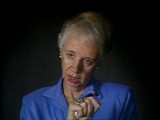
-
Ruth Webber describes escaping from a selection held in the Auschwitz infirmary
Oral HistoryRuth was four years old when the Germans invaded Poland and occupied Ostrowiec. Her family was forced into a ghetto. Germans took over her father's photography business, although he was allowed to continue working outside the ghetto. Before the ghetto was liquidated, Ruth's parents sent her sister into hiding, and managed to get work at a labor camp outside the ghetto. Ruth also went into hiding, either in nearby woods or within the camp itself. When the camp was liquidated, Ruth's parents were split up.…
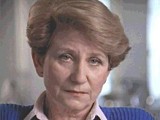
-
Ruth Webber describes her mother's efforts to ensure her children's survival
Oral HistoryRuth was four years old when the Germans invaded Poland and occupied Ostrowiec. Her family was forced into a ghetto. Germans took over her father's photography business, although he was allowed to continue working outside the ghetto. Before the ghetto was liquidated, Ruth's parents sent her sister into hiding, and managed to get work at a labor camp outside the ghetto. Ruth also went into hiding, either in nearby woods or within the camp itself. When the camp was liquidated, Ruth's parents were split up.…
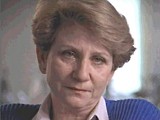
-
Ruth Webber describes the Auschwitz crematoria
Oral HistoryRuth was four years old when the Germans invaded Poland and occupied Ostrowiec. Her family was forced into a ghetto. Germans took over her father's photography business, although he was allowed to continue working outside the ghetto. Before the ghetto was liquidated, Ruth's parents sent her sister into hiding, and managed to get work at a labor camp outside the ghetto. Ruth also went into hiding, either in nearby woods or within the camp itself. When the camp was liquidated, Ruth's parents were split up.…
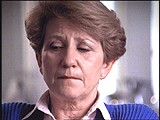
-
Ruth Webber describes the bitterness that she felt after the end of the war when she was in an orphanage in Krakow
Oral HistoryRuth was four years old when the Germans invaded Poland and occupied Ostrowiec. Her family was forced into a ghetto. Germans took over her father's photography business, although he was allowed to continue working outside the ghetto. Before the ghetto was liquidated, Ruth's parents sent her sister into hiding, and managed to get work at a labor camp outside the ghetto. Ruth also went into hiding, either in nearby woods or within the camp itself. When the camp was liquidated, Ruth's parents were split up.…
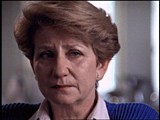
-
Ruth Webber describes the bitterness that she felt after the end of the war when she was in an orphanage in Krakow
Oral HistoryRuth was four years old when the Germans invaded Poland and occupied Ostrowiec. Her family was forced into a ghetto. Germans took over her father's photography business, although he was allowed to continue working outside the ghetto. Before the ghetto was liquidated, Ruth's parents sent her sister into hiding, and managed to get work at a labor camp outside the ghetto. Ruth also went into hiding, either in nearby woods or within the camp itself. When the camp was liquidated, Ruth's parents were split up.…

-
Ruth Webber describes witnessing a brutal punishment in the camp at Ostrowiec
Oral HistoryRuth was four years old when the Germans invaded Poland and occupied Ostrowiec. Her family was forced into a ghetto. Germans took over her father's photography business, although he was allowed to continue working outside the ghetto. Before the ghetto was liquidated, Ruth's parents sent her sister into hiding, and managed to get work at a labor camp outside the ghetto. Ruth also went into hiding, either in nearby woods or within the camp itself. When the camp was liquidated, Ruth's parents were split up.…
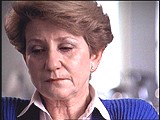
-
Sally Pitluk describes forced labor in Budy
Oral HistorySally Pitluk was born to Jewish parents in Płońsk, Poland in 1922. A few days after the German invasion of Poland in 1939, Płońsk was occupied. Sally and her family lived in a ghetto from 1940-1942. In October of 1942, Sally was transported to Auschwitz, where she was tattooed and moved into the subcamp Budy for forced labor. She stayed in the Auschwitz camp complex until the beginning of 1945 when she and other prisoners were death marched to several different camps. She was liberated in 1945 and…
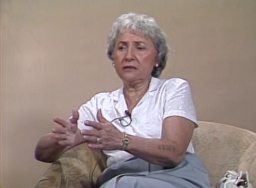
-
Sally Pitluk describes her removal from forced labor at Budy
Oral HistorySally Pitluk was born to Jewish parents in Płońsk, Poland in 1922. A few days after the German invasion of Poland in 1939, Płońsk was occupied. Sally and her family lived in a ghetto from 1940-1942. In October of 1942, Sally was transported to Auschwitz, where she was tattooed and moved into the subcamp Budy for forced labor. She stayed in the Auschwitz camp complex until the beginning of 1945 when she and other prisoners were death marched to several different camps. She was liberated in 1945 and…
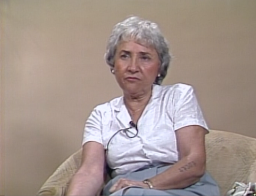
-
Sam Itzkowitz describes a death march from Landsberg, a subcamp of Dachau, to the Bavarian Alps
Oral HistoryThe Germans invaded Poland in September 1939. When Makow was occupied, Sam fled to Soviet territory. He returned to Makow for provisions, but was forced to remain in the ghetto. In 1942, he was deported to Auschwitz. As the Soviet army advanced in 1944, Sam and other prisoners were sent to camps in Germany. The inmates were put on a death march early in 1945. American forces liberated Sam after he escaped during a bombing raid.
